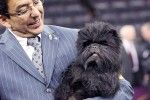Labrador Retrievers Still Not Top Dog

Every year, Madison Square Garden hosts the Westminster Kennel Club Dog Show, in which dogs of all different breeds are judged based on their appearance, walk and overall performance. The event hosts up to 2,500 dogs, and at least five of each breed participate in the show.
Currently, Westminster takes place over two days and nights every February. During the day, the dogs compete against other dogs of the same breed. Each winner (Best of Breed) advances into its respective class group: Sporting, Hound, Working, Terrier, Toy, Non-Sporting and Herding. The group competition is at night, and the seven winners advance to the finals, during which one judge will select one of them as the Best In Show winner.
The show has been broadcast on live television since 1948 and usually airs on a Monday and Tuesday. At Madison Square Garden, the event has been sold out since 2005.
Each year, the winning dog becomes “America’s Dog” until the next year’s show. The dog celebrates his title with a media tour on the day after the show, with appearances on most television network morning shows and nationwide fame for a whole year. An Affenpinscher named Banana Joe won Best in Show at this year’s competition, beating out breeds such as a Sheepdog, a Portuguese Water Dog and a Fox Terrier.
While they have been the most popular dogs in the past twenty-two years, the Labrador retriever has been shut out in every single competition, making them 0-136 in Westminster Dog Shows. In the 2013 competition, 54 Labradors entered the competition, making it the
second-most entries for a breed. Despite its high amount of entries, which are consistently high every year, the Vegas odds for a Labrador to win are 450-to-1. The Labradors haven’t come even remotely close to winning the Sporting group title since 2010 when a pooch named James finished fourth. The best odds given to a Labrador since odds were introduced was 55-to-1.
So why have Labradors been so unable to break through the group stage? The Sporting group in which they compete in is very strong. Overall, the group generated nineteen Best in Show winners, including the Sussex Spaniel in 2009, English Springer Spaniel in 2007 and German shorthaired pointer in 2005. These types of dogs are what experts call “flashy” breeds. “If I were to tell a Labrador person to have more flash and dash, they’d probably stone me,” James Reynolds, the 2011 Sporting judge at Westminster, said.
As opposed to their competitors, Labradors lack the luxury of a long coat or the elegance of a fast gait, making it trickier to catch a judge’s eye. Additionally, some dogs are selfish, a quality that helps them show off at the show and maybe give them the gold. Labradors have such a good temperament so it could be hard for them to keep just themselves in the spotlight.
Some owners claim that the shutout is due to the Labrador’s breed standard, or the rules for a dog’s presence and movement. Show dogs face off against the standard and are judged individually. What judges evaluate in a Labrador “are its head (‘clean-cut’ with ‘broad back skull’), coat (black, yellow or chocolate) and tail. Also important are ‘powerful jaws’ and ‘friendly eyes.'” according to the Wall Street Journal article “Everybody Loves Labradors, So Why Are They Underdogs?” For Labradors, The American Kennel Club’s standard requires a dog that is “strongly built, medium-sized, short-coupled” in order to retrieve game, hunt in the water and impress some judges.
A main problem for Labradors is that many of them are not bred to compete in shows. Dogs bred to work in the field tend to be longer and leaner than Labradors made to compete in shows. To maintain the breed standard, male Labradors should weigh between 65 and 80 pounds, and females 55 and 70 pounds. A lot of fieldwork
Labradors tend to weigh around 100 pounds.
Most of the public does not know that there is a smaller circuit of dog shows across the country. Many owners bring their dogs to these shows to gain a better profile and advertise themselves to be the best of the best come Westminster time.
Labrador owners claim that other dogs and their owners tend to utilize this tactic often in order to get themselves in a better position to win the
big prize.
Although the Labrador is the most popular breed in the States, it won’t buy them any advantages in competitions. “I don’t think anyone consciously goes in the ring saying, ‘Well, a lab’s never won the group, but at the Garden, I’m going to change that,'” 2012 Westminster Best in Show Judge Cindy
Vogels said.
While this year the Labradors failed to win yet again, it seems they just have to maintain the same spirit they have kept for 136 years. Look towards next year, Labradors.
Contact Andrew Vojt at



